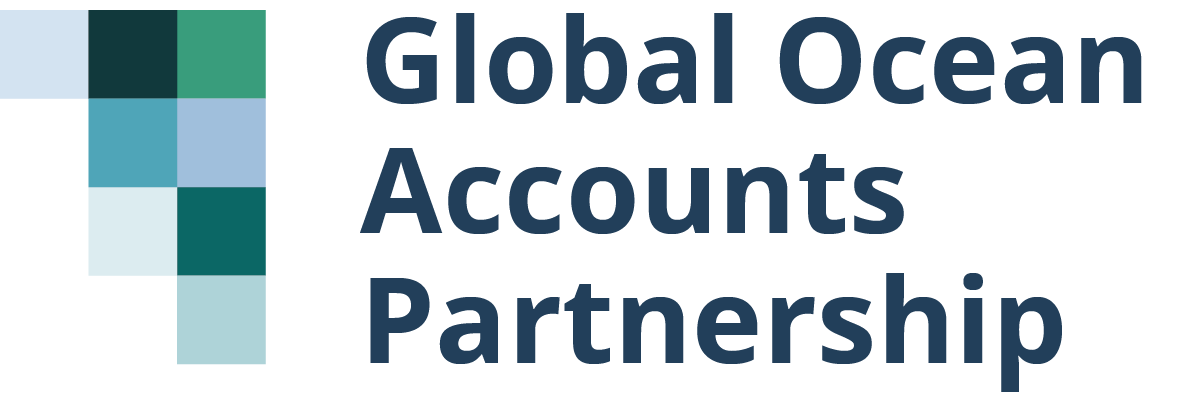What we heard, shared and saw delivered at the UN Ocean Conference
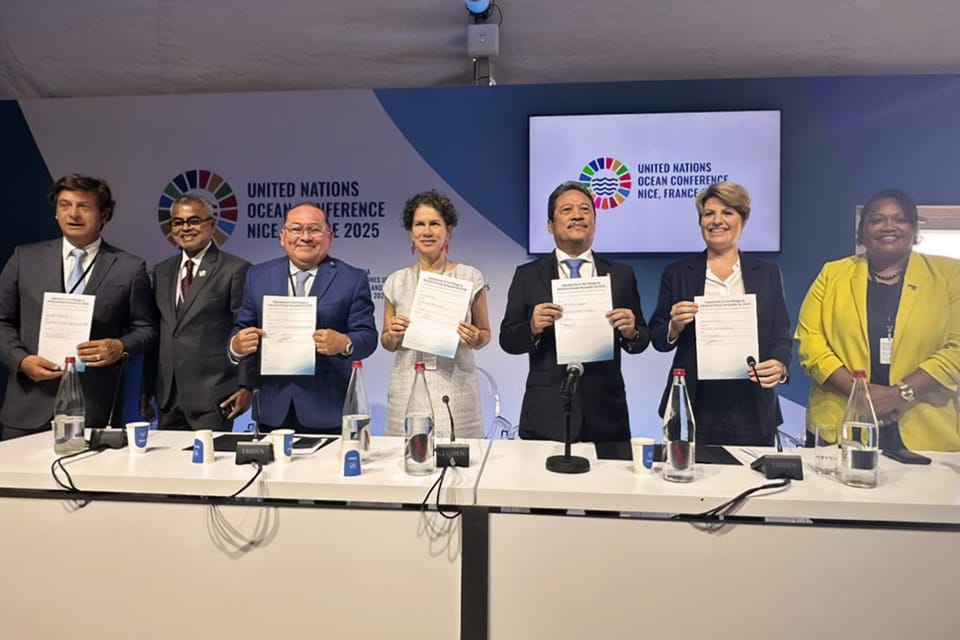
The world was watching the 3rd UN Ocean Conference in Nice last week with high expectations on the outcomes delivered for the world’s ocean.
So, what was delivered? What happens next?
Authors: Eliza Northrop, Phil James, Liz Hollaway and Marianne Feoli Martinez
The 3rd UN Ocean Conference (UNOC 3) concluded with significant declarations and renewed commitment to deliver on the vision for Sustainable Development Goal 14 under the 2030 Agenda for Sustainable Development. Throughout the week-long event, presentations, commitments, debates and passionate pleas made one thing clear: the global community must act now to protect our greatest asset—the ocean.
UNOC 3 proved to be a crucial political moment, recognising that ocean sustainability isn't merely an environmental nice-to-have. Countries brought attention to the mounting pressures facing our shared ocean: making it clear immediate global action is needed.
Importantly, the conference acknowledged that decision-making must factor in more than just financials and funding, recognising the connections between human wellbeing, ecosystems and economic sustainability. Representatives from big ocean/small island states and coastal nations consistently raised the need to account for social factors and the perspective of communities who most depend on the ocean.
These are the 5 major themes and achievements that we saw emerge from UNOC as key areas to watch in the year ahead:
The BBNJ Agreement is on the cusp of becoming international law
The Agreement under the United Nations Convention on the Law of the Sea on the Conservation and Sustainable Use of Marine Biological Diversity of Areas beyond National Jurisdiction (BBNJ Agreement) represents a landmark agreement to protect biodiversity in the high seas.
Areas beyond national jurisdiction (or the 'high seas')—cover over 60% of the world's ocean (43% of Earth's surface) and contain 90% of its biomass. Despite their vast expanse and critical importance to global ecological systems, these areas remain among the least protected and most vulnerable ecosystems on our planet.
High seas biodiversity faces mounting threats from climate change, overfishing, seabed mining, plastic pollution, noise pollution, and other anthropogenic activities that are intensifying at an alarming rate.
Although the BBNJ Agreement was adopted unanimously in 2022, it requires countries to formally ratify the agreement before it enters into force and becomes binding under international law. Going into UNOC 3, just 31 countries out of the 60 needed had ratified the treaty. By its conclusion, this had surged to 50 countries with many more, including Australia, announcing their commitment to ratify as soon as possible. There were also an additional 20 countries who signed the Agreement, bringing the total signatures to 136. This makes it extremely likely that the threshold of 60 countries will be reached this year, with the Agreement entering into force early in 2026.
The BBNJ Agreement will represent a significant change in how the high seas are protected and managed, and enable the implementation of large marine protection areas critical for addressing biodiversity loss and plunging fish stocks.
Current estimates indicate that less than 1% of the high seas are fully protected - creating an urgent need for strategic expansion of marine protected areas (MPAs) in ABNJ. The BBNJ Agreement will be an important step toward achieving the ambitious target to conserve 30% of land, waters and seas by 2030 - (colloquially known as '30x30') agreed to in the Kunming-Montreal Global Biodiversity Framework (GBF). Without large protected areas in international waters, protecting 30% of the world's ocean will be nearly impossible.
Strengthened resolve to conclude the historic global agreement ending plastic pollution
Over 95 countries, including Australia, joined the 'Nice wake-up call for an ambitious plastics treaty' - a powerful declaration calling for enhanced ambition to conclude the first-ever legally binding global agreement to end plastics pollution.
The declaration identifies the following five points as key to reach an agreement that is commensurate with what science tells us and our citizens are calling for:
- A full lifecycle approach — including upstream measures such as reducing plastic production
- Phasing out chemicals of concern and problematic plastics
- Smarter product design
- Effective means of implementation and the establishment of accessible financing to support this
- A treaty that can evolve over time including the use of decision-making tools and procedures if consensus cannot be reached
The Nice wake-up call comes after negotiations came to a frustrating stall in Busan, South Korea last year at INC-5.1 when no consensus could be reached on several of the treaty's key elements. It was supported by numerous Heads of State and Ministers including strong calls of support in their national statements. These statements of commitment reflect a determination to prioritise environmental protection over industry preferences for voluntary measures, as countries prepare for resumed negotiations in 2025 with the goal of creating a legally binding instrument that holds all nations to high common standards in tackling the global plastic pollution crisis.
The world will be watching when negotiations resume at INC-5.2 in Geneva, Switzerland from 5-14 August this year to see if this wide ambition is enough to push for a globally adopted, legally binding and ambitious plastics treaty.
The Global Ocean Accounts Partnership (GOAP) Secretariat, UNSW Centre for Sustainable Development Reform and its partners will continue to support Member States to develop the evidence base needed to manage plastic pollution. This includes a Data Checklist and Global Plastics Data Tracker and upcoming Handbook for Plastics Inventories and Accounts.
ABC Weekend interview on plastics treaty at UNOC with Eliza Northrop
Ocean accounts emerge as the cornerstone of sustainable ocean economies
What emerged from UNOC was a clear understanding that as demands on marine environments increase, countries need better information systems to manage ocean use, protect biodiversity, and address climate impacts. Ocean accounts were seen as delivering this by providing systematic frameworks to measure marine ecosystems, track their health, and quantify their economic and social contributions toward equitable and sustainable development.
Since 2019, the Global Ocean Accounts Partnership (GOAP) and ocean accounting practices have grown significantly. UNOC 3 marks the first time ocean accounting has been formally recognised in a major UN ocean declaration, elevating it from a technical tool to a global policy priority.
This recognition was cemented through the launch of the Pledge to Advance Ocean Accounts by 2030 which contributed significantly to the visibility and momentum of ocean accounts throughout the conference. Led by Costa Rica, and supported by the Global Ocean Accounts Partnership (GOAP), aims to advance the integration of ocean accounts into decision-making frameworks by 2030. By the conference's end, 19 countries and seven organisations had signed the Pledge, including GOAP Co-Chairs—the Ministry of Marine Affairs and Fisheries, Indonesia and Charles Darwin Foundation for the Galapagos Islands, Ecuador—along with GOAP member countries: Palau, Viet Nam, Mozambique, Belize, Norway, United Kingdom, Togo, Mexico, Canada, Maldives, and Australia.
This political commitment has ultimately led to the explicit inclusion of ocean accounting in the final UNOC 3 Political Declaration, Our ocean, our future: united for urgent action.
In point 28 of the Declaration, ocean accounts are recognised as a key mechanism to 'accelerate action' for the sustainable ocean economy. Parties recognise 'the critical need for national ocean accounting' as essential infrastructure to accelerate ocean conservation and sustainable ocean management.
The deeper significance that Minister Alitia Bainivalu, Fiji's Minister for Fisheries and Forests, eloquently captured:
'Ocean accounting is not a spreadsheet. It is a statement of respect. It tells us and the world that our oceans matter, and they deserve to be protected with knowledge, investment, and love… it is how we build an economy that is blue, but also true to our people, to our traditions, and to our future.'
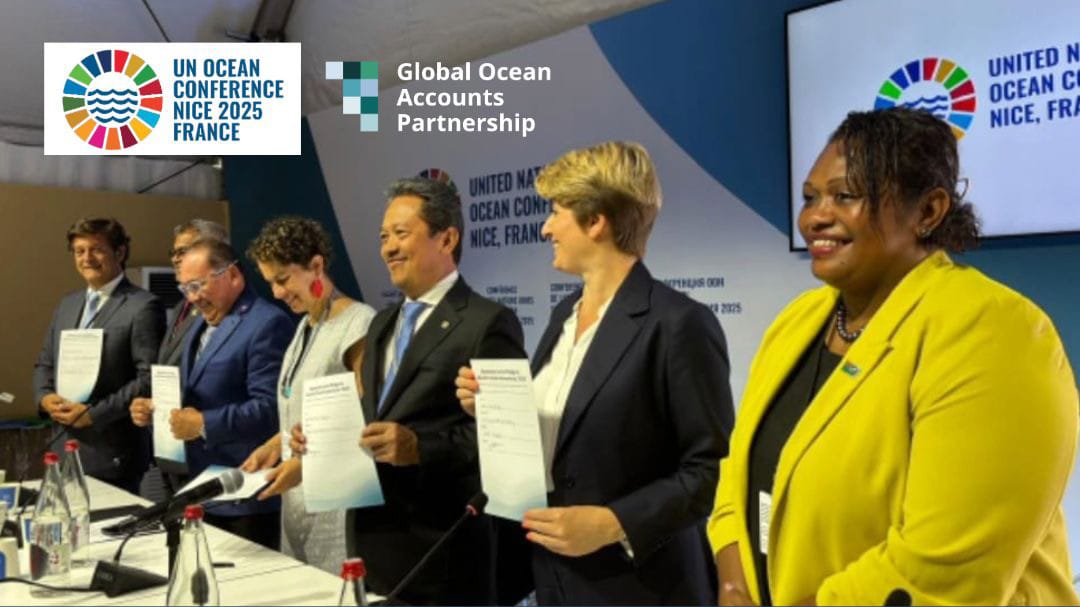
People-centred ocean finance: Ensuring justice and equity
Ensuring people are at the heart of the transition to a sustainable ocean economy, including ocean conservation and protection, was an increasing drum beat heard throughout UNOC 3. It means prioritising the needs and rights of coastal communities, Indigenous peoples, and small-scale fishers who depend directly on marine resources for their livelihoods and cultural identity.
This human-centred approach ensures that financing mechanisms not only protect ocean ecosystems but also support equitable access to resources, fair benefit-sharing, and meaningful participation of local communities in decision-making processes that affect their marine environments.
The Maldives urged developed countries and creditors to reduce borrowing costs for SIDS, in a passionate statement to the plenary on day 1 of UNOC 3:
'Crucially, the most effective financial solutions are those that are shaped from the ground up—designed with, and by the private sector and local communities, not merely imposed upon them.
That is not charity. That is justice. Ocean justice.
We do not ask for handouts. We offer leadership and the tools to show real progress. Let us not ask for small islands to do big things with small means. Let us invest in partnerships, ones where local action can drive global results.'
Without equitable access to funding, these countries—many of which have the largest ocean territories and most biodiverse marine ecosystems—lack the resources to implement critical conservation measures, sustainable fisheries management, and coastal protection programmes. Accessible ocean finance mechanisms, including simplified application processes, capacity building support, and flexible funding instruments, are essential to bridge this gap and ensure that ocean conservation efforts reflect global participation rather than being limited to wealthier nations with existing financial infrastructure.
The Blue Economy Finance Forum (BEFF), convened by H.S.H. Prince Albert II of Monaco in the days preceding UNOC 3 , brought together heads of government, multilateral institutions, and private finance actors to catalyse new and innovative sources of finance and accelerate investment and innovation for the ocean economy.

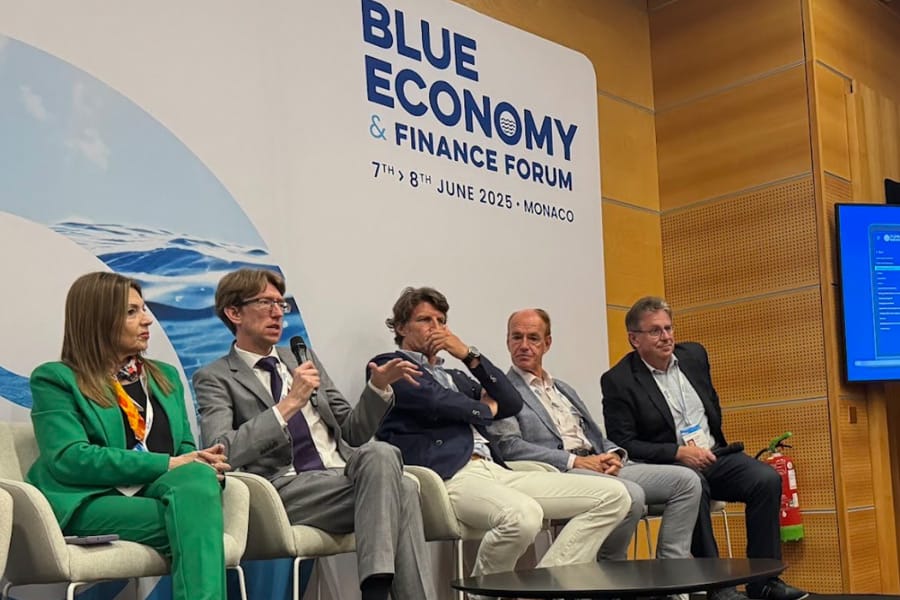
Among the major announcements made were: CAF–development bank of Latin America and the Caribbean–announced that it will invest USD 2.5 billion to boost the sustainable blue economy and preserve the region's oceans; a commitment from Pacific leaders to Unlocking Blue Pacific Prosperity (UBPP)–a historic initiative where all 22 Pacific Island Countries and Territories agreed to sustainably manage 100% of their collective ocean territories and protect at least 30% of it by 2030; and Australia's reaffirmation of its $100 million investment in the Pacific Resilience Facility to support Pacific-led climate finance solutions.
What's next?
The 3rd UN Ocean Conference saw countries committing to a transition to a sustainable ocean economy that is backed by data, science and political will.
With plastics treaty negotiations resuming in Geneva this August and multiple breakthrough commitments from Nice - 2026 will be the critical year when countries must translate their commitments into measurable action.
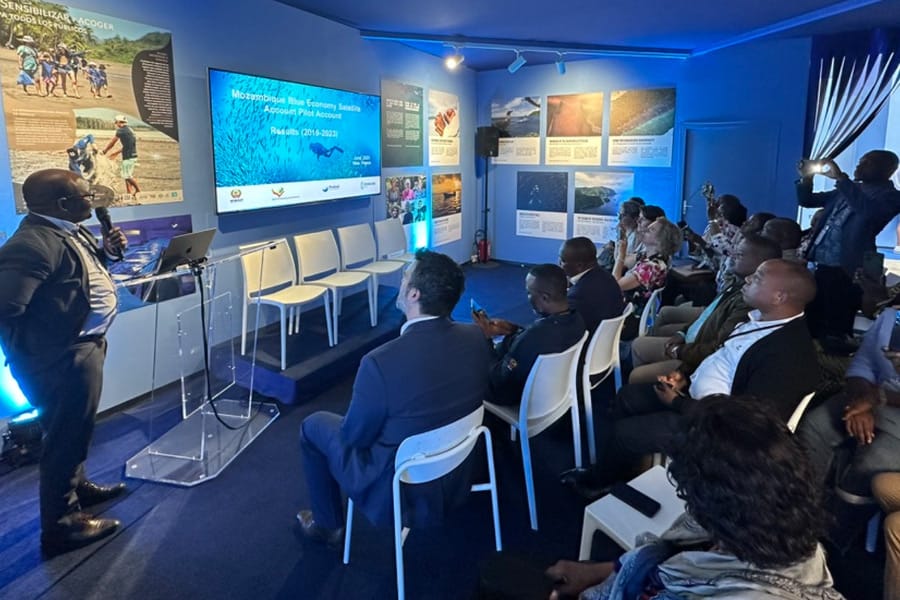
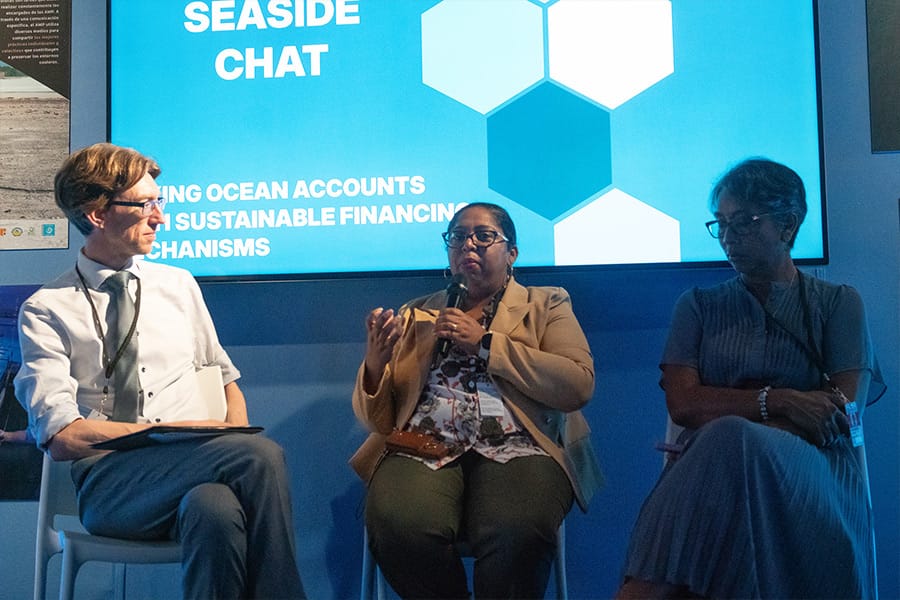
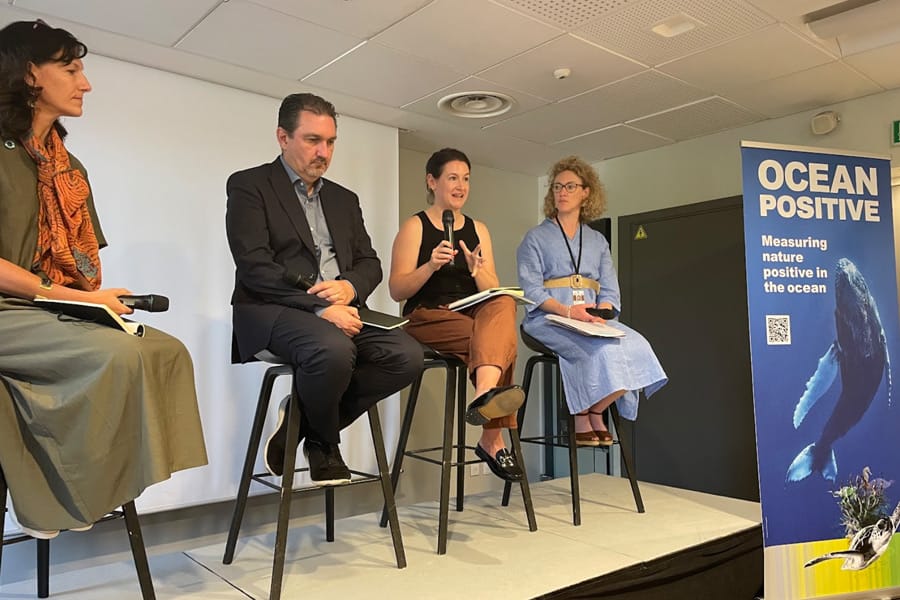
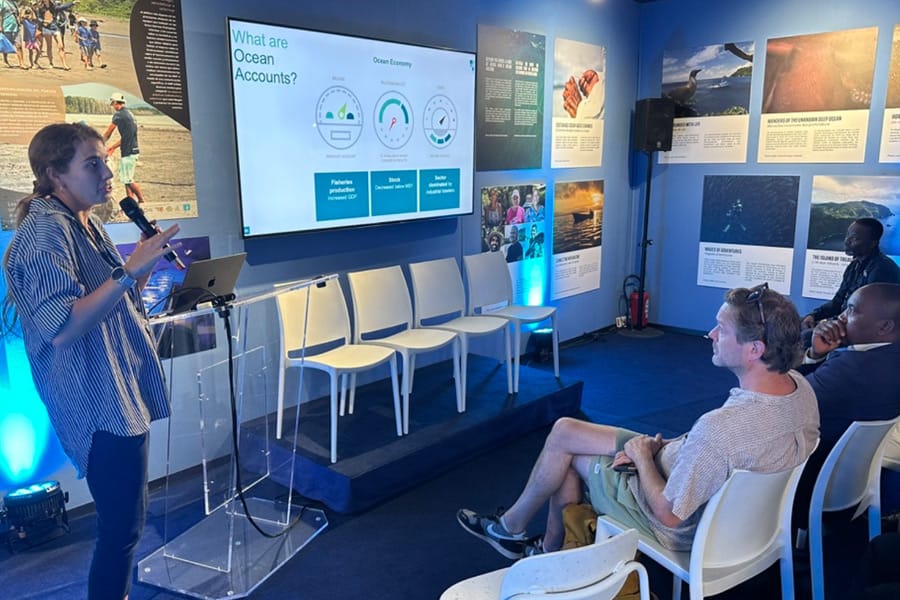
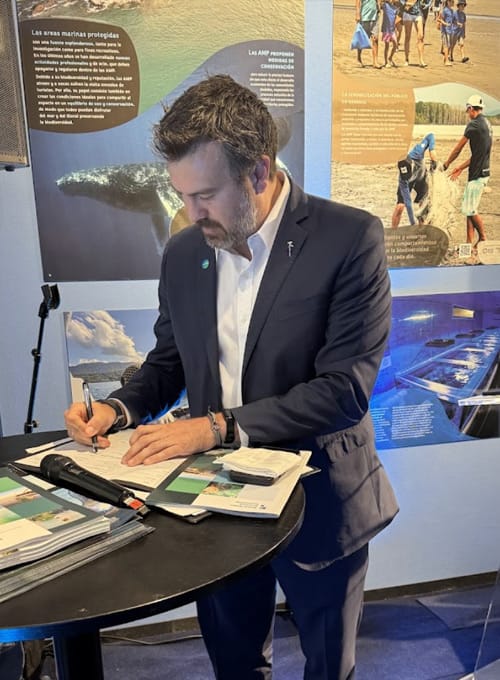
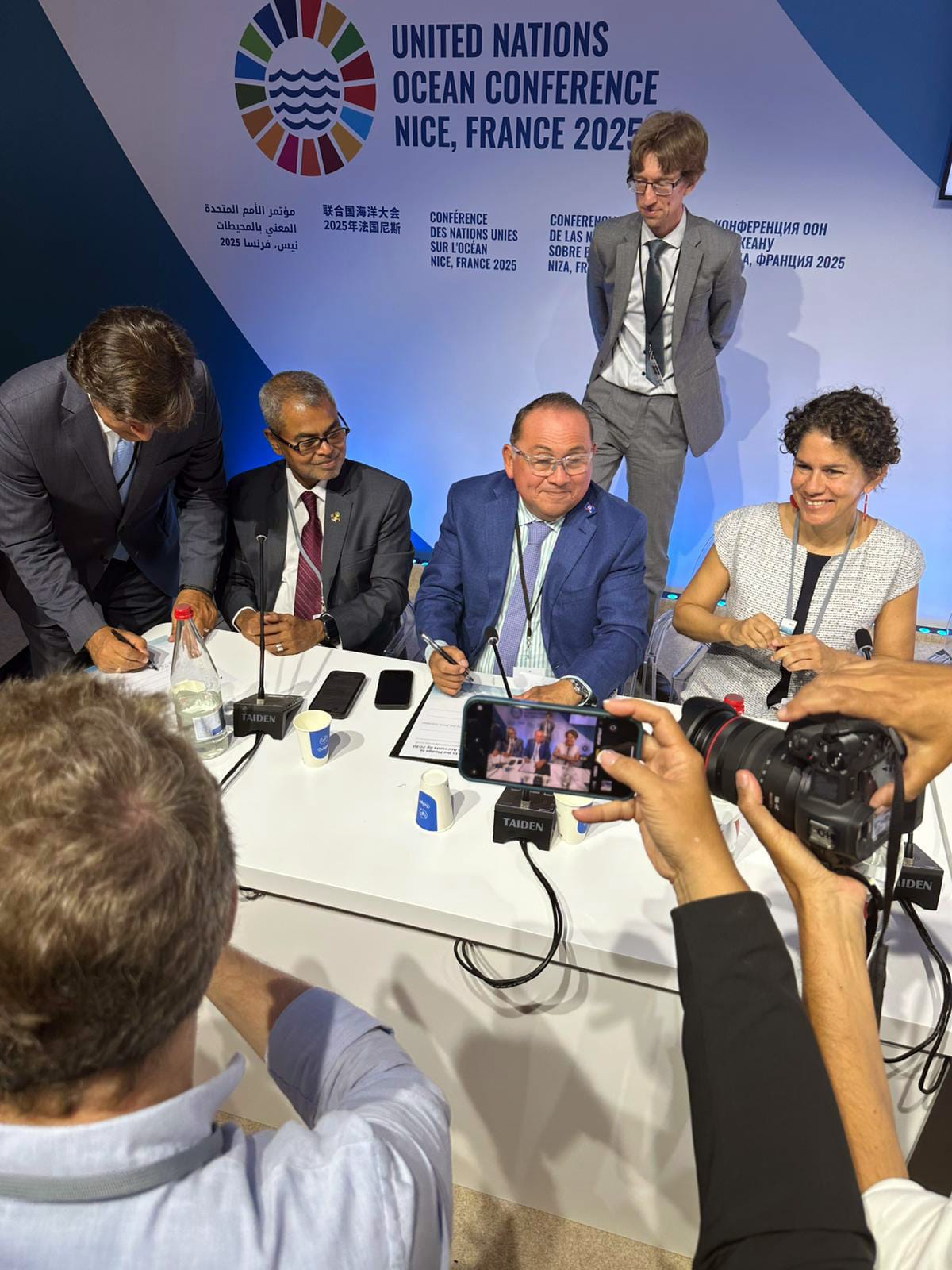
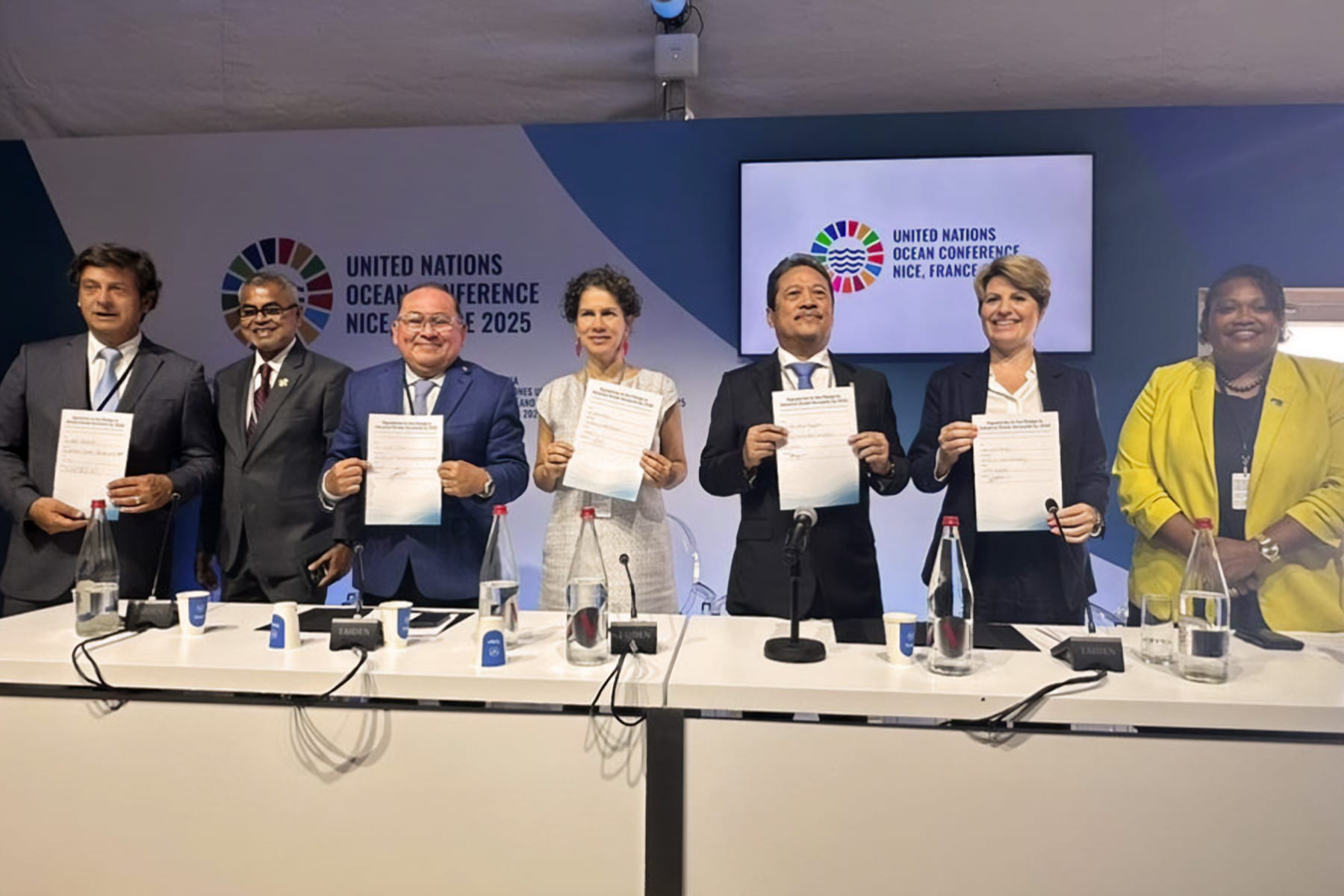
Photos from UNOC Ocean Accounts events
Pledge signatories in main photo (l to r)
Salvador Malheiro, Secretary of State for Fisheries and Maritime Affairs (Portugal)
Thoriq Ibrahim, Minister of Tourism and Environment (Maldives)
Andre Perez, Minister of Blue Economy and Marine Conservation (Belize)
Maisa Rojas, Minister of Environment, Chile
Sakti Wahyu Trenggono, Minister of Maritime Affairs and Fisheries (Indonesia)
Emma Hardy, Minister for Water and Flooding (United Kingdom)
Minister Alitia Bainivalu, Minister for Fisheries and Forests (Fiji)
